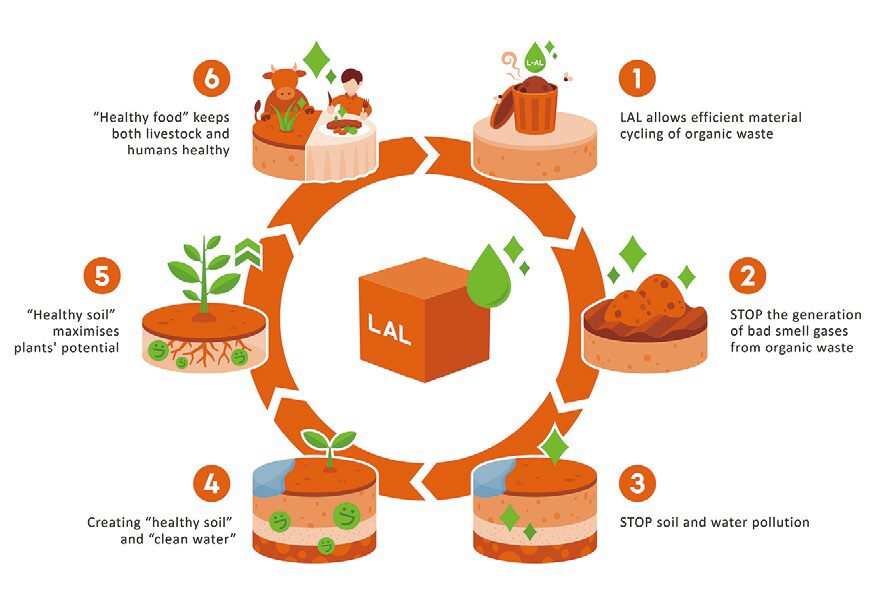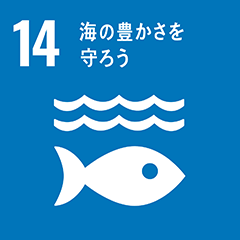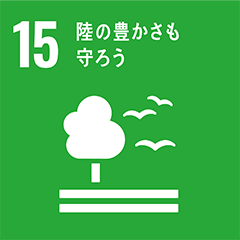Inochi Declaration
The proper circulation of nitrogen—source of all Inochi—nurtures healthy soil and water, thriving grass and cattle, and delicious milk. Leverage technology to recycle “poop” and contribute to solving the global nitrogen crisis.
The bodies of humans and all living beings—once water and lipids are removed—are largely composed of proteins. These proteins originate from nitrogen in the atmosphere, which is taken up through the soil, plants, animals, and microorganisms via the grand cycle of Inochi that we all share.
Naturally occurring “good nitrogen” compounds—such as ammonia that plants can absorb—have historically only existed in very limited quantities, produced by nitrogen-fixing bacteria and other sources. However, with the invention of the Haber–Bosch process in the 20th century, humans developed the ability to produce nitrogen fertilizers artificially, enabling a dramatic increase in crop yields, a food supply surge, and a subsequent explosion in global population.
While synthetic nitrogen fertilizers helped address issues like poverty and hunger and brought enormous benefits to humanity, they also introduced serious environmental consequences. A large portion of nitrogen fertilizers applied to crops is not absorbed, instead causing soil acidification, degradation (desertification), and eutrophication in rivers and oceans—leading to phytoplankton blooms and oxygen depletion that devastate ecosystems, such as coral reefs.
This core issue of the nitrogen crisis—considered even more severe than carbon emissions in some major agricultural countries including the EU—is that much of the synthetic nitrogen is not being properly utilized by plants and is instead flowing away unused.
In addition, as 90% of land animals are now humans and livestock, the large amounts of human and livestock “poop” being discharged are also a major factor in exacerbating the nitrogen problem on the planet. Although the production and use of synthetic nitrogen fertilizers has skyrocketed, the nitrogen contained in animal and human waste has not been adequately recycled. Instead, it has been released into the atmosphere and aquatic systems via sewage treatment or composting, resulting in an overabundance of “good nitrogen” on Earth—exceeding the planetary boundary and attracting global attention as a critical environmental concern.
At a dairy farm in Hokkaido, LIFULL Agri Loop Inc. has introduced an innovative “Poop Loop” system. Using iron-based catalysts, the nitrogen in cow manure is transformed into usable “good nitrogen,” enabling the farm to grow nutritious grass without chemical fertilizers and raise healthy cows solely on that grass. This system produces virtually no harmful ammonia or greenhouse gases and is completely odorless. The catalyst prevents nitrogen from oxidizing and allows it to be safely stored as a stable fertilizer. Fields treated with this fertilizer show reduced soil acidification and yield high-sugar grasses, resulting in healthier, long- lived cows that produce abundant, rich milk. Furthermore, the farm has not only eliminated its use of chemical fertilizers but also no longer needs to purchase grain-based feed, significantly reducing its environmental footprint while enhancing agricultural productivity.
In Japan, where most livestock farmers operate at a loss and agriculture is often perceived as one of the “3K” jobs—kitsui (demanding), kitanai (dirty), and kasegenai (unprofitable)— such innovations that simultaneously address the nitrogen problem and create profitable agriculture are of profound significance, especially given the declining number of farmers and Japan’s low food self-sufficiency.
The nitrogen contained in livestock waste in Japan is nearly equivalent to the total nitrogen used in chemical fertilizers. As one of its key initiatives toward 2050, LIFULL Agri Loop aims to widely promote the conversion of livestock and human waste into “good nitrogen” using technology that suppresses oxidation. This would help reduce soil degradation, nitrogen contamination in aquatic systems, and emissions of nitrogen-derived greenhouse gases. Ultimately, this would improve overall environmental health—and through food, human health as well.

“Poop Loop” solving the nitrogen problem
The Inochi Forum, in collaboration with diverse organizations, will continue to raise public awareness about the importance of nitrogen circulation and expand educational outreach to promote broader understanding and empathy. Additionally, we will support the discovery and implementation of various technologies that contribute to better nitrogen circulation through collaborative and co-creative platforms between academia and industry.
[References]
・Kentaro Hayashi, “Sustainable Nitrogen Use for Environment and Food Security” (AJASS Symposium)
https://ajass.jp/Sympo/2023/2hayashi.pdf
・Ministry of the Environment, Government of Japan, 2022 White Paper on the Environment, Recycling, and Biodiversity
https://www.env.go.jp/policy/hakusyo/r05/html/hj23010101.html
・Japan Fertilizer and Ammonia Association – Nutrient Composition of Livestock Manure
http://www.jaf.gr.jp/faq.html
[Action Platform]
Food and Agriculture
[SDGs]




